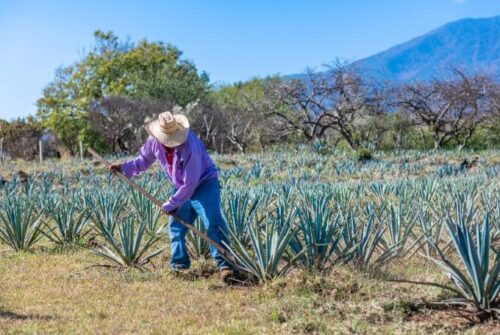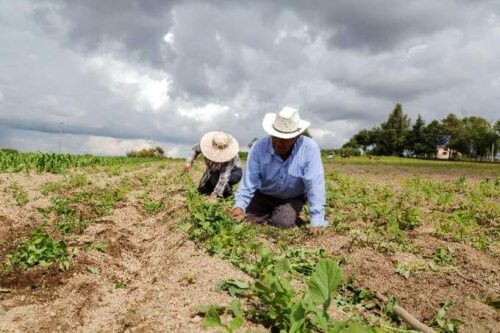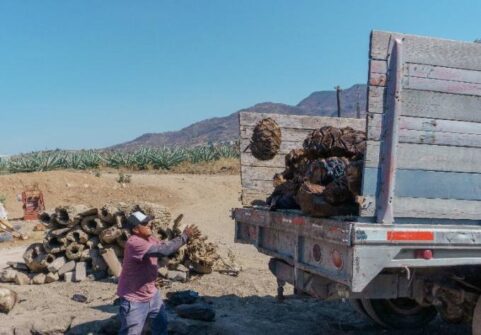Frontier’s Story. In the Shade of the Mango Trees.
For thirty years, Yeyo wandered from plantation to plantation in southern Mexico. Undocumented, humiliated, and oppressed, he decides with his brothers to return home.
Yeyo grew up looking at the deep scars on his father’s back from carrying bunches of bananas during the hellish tropical days in Chiapas and his mother’s arms scorched from making potato empanadas to sell outside the plantations.
Workers of a thousand trades struggled to survive as undocumented immigrants in Tapachula, southeast of the state of Chiapas in Mexico, near the Guatemalan border and the Pacific Ocean.
Always working at precarious jobs, poorly paid and without any financial help, they would go here and there in the region and always receive the same treatment and payment.

Photo: 123rf.com
They worked on the coffee harvest during the season in the Tapachula part of the municipality, three months on the plantation sleeping in large dormitories with two meals a day.
First, his mother came, carrying him on her back. When he grew up, he would help the others. Yeyo could not go to school because his parents moved from one place to another during the harvest season and this did not allow him to study; he barely knew how to read and write.
In Soconusco, a region southwest of the state of Chiapas, they worked harvesting pineapples, papayas, and coffee. In Huixtla, in the sugar cane season, only his father worked, while he and his mother sold potato pies at the entrance to the plantation.
At the age of six, Yeyo was already making tortillas, grinding nixtamals, collecting chiriviscos for the comal fire, carrying water in two-litre plastic containers and bathing his dog Papayo.
When he was eight his sister Inés was born and he became the elder brother. He was now in charge of making the sauce, chopping wood, and making the dough while his mother fed his sister and finished preparing the potatoes for the empanadas.

Guatemalan workers planting in a Mexico’s farming field. 123rf.com
They slept in huts made of plastic and sheets of cardboard that they managed to take to the plantation loading areas and, like dozens of undocumented immigrants at harvest time, set up camp in the plantations.Yeyo and his sister Inés know little about their parents’ trip to Mexico from Guatemala.
From her mother, he knows the story that she had left her eastern city, managed to reach the capital and found herself at the bus station that went to the San Marcos department on the border between Mexico and Guatemala, with him in her arms and with Papayo, their dog.
Across the river Suchiate, on the border, their father was waiting for them, having gone on ahead a few months earlier to prepare for their arrival. They intended to go to the United States but after using their savings to pay for the trip and the coyote fees, they remained in Tapachula working on a banana plantation where the owners hired undocumented migrants for a third of the cost of Mexican day labourers.
They thought it would only be for two months, but the two months turned into 30 years, moving from one plantation to another. His parents never returned to Guatemala since they left; she was 17 and he was 20. There they had a small brick house with a roof made of palm trees. Her mother Isaura worked in a mill in the morning and in the afternoon, she cleaned various shops on the main street of the town.

Man loading a truck with agave pineapples after being cooked. 123rf.com
His father Clemente worked at harvest time in the fields of melons and tobacco and cutting peppers and loroco, but the rest of the year he was a helper at the slaughterhouse. His job was to clean the skins of the cattle. Even while pooling both their earnings, they could barely make ends meet. Then Yeyo was born and they had not enough to live on, so they decided to emigrate to the United States via Mexico. But they didn’t have any money for the trip or the ‘coyote’ and so his father continued working with another group of friends who also left the city.
Finally, only his father remained in Tapachula as the others decided to continue on their way.
It was in the coastal commune of Suchiate, on the Pacific Ocean side, that the family grew up, working for ten long years on banana, papaya and mango farms. Yeyo was now approaching adulthood, with muscular, fleshy arms, and round shoulders. He joined his father at work, while his mother, along with Inés and his brothers, José and Toño born a few years later, made empanadas to sell on the street.
They never had a home of their own and Yeyo remembers living in at least 15 different places, in different parts of the state, with no other personal effects other than a change of clothes and personal sacks with their clothes and toothbrushes.
In the common sack, they had some alcohol, laundry soap, a pewter jar, plastic cups, ponchos and the mosquito nets that his mother made from some pieces of cloth for a wedding veil she had bought in a market in Tapachula, along with a picture of Our Lord of Esquipulas.

Twenty years have passed and they have not yet managed to get their documents in order, just like the other hundreds of families who worked by the day in the plantations, exploited and oppressed, suffering the vicissitudes of illegal immigrants in a land where the inhabitants had the same skin colour as themselves, were physically very similar, and spoke the same language.
One day his father had an accident at work. They ran to tell him but when Yeyo arrived his father was already dead. The owners of the plantation have never taken responsibility for accidents at work, especially not for those without documents. The only moral and financial support came from colleagues who pooled the money to have the body cremated. It was too costly to send the body to Guatemala and his parents never wanted to be buried in Mexico.Yeyo took charge of the family while his mother and his siblings, who never went to school due to the characteristics of family work, were occupied with selling potato empanadas. Five years later his mother died of a stroke. Colleagues helped by pooling the money to have her cremated.

“They took a bus in Tecún Umán, San Marcos, bound for the Guatemalan capital”
Yeyo was devastated by the responsibility of taking care of his three siblings. The long months seemed like years and one night coming back from work, he spoke to his siblings. They collected all their things. In one sack they placed the two urns with the parents’ ashes and, in another, they put three puppies, grandchildren of Papayo. They turned not to the north but to the south and crossed the Suchiate River. Then they took a bus in Tecún Umán, San Marcos, bound for the Guatemalan capital. Without ever having been in the country, they managed to find a bus going to Teculután, Zacapa, the hometown of their parents.
Tears rolled down the faces of all three as they walked into downtown Teculután and saw people selling Cashasha tamales, the tamales their parents used to long for, the ones they talked about in the evening. They were surprised by the unique smell of the Zacapa quesadillas that abounded in the baskets of the vendors running behind the buses and the drivers who stopped to buy.
They saw bags of tender mangoes, jocote marañon, peanuts with salt, nuggets and chilli, pounds of dry cheese, bagged cream, and cheese with holes.There were children selling bags of fresh tamarind, Jamaica rose and cashew jotote on the streets. They felt the dry heat so different from that of the humid tropics of Chiapas. Thirty years had passed since Yeyo had left his city, carried on his mother Isaura’s back. He was home at last, back in the land of his birth.

“They saw the house that their mother had spoken about so often”
The four of them walked on with the puppies and all their family belongings contained in three bags. The shade of the mango trees cooled their journey.
Finally, they saw the house that their mother had spoken about so often. With a lump in his throat, Yeyo grasped the key and opened the door. They were back home at last, where it all began. Isaura and Clemente’s children. Even Papayo’s little grandchildren had returned.
They dusted down the pine table, spread out the cot, swept the clay floor and admired the manicured patio, with its coriander bushes, izotes, coffee bushes, almond, papaya, and mango trees. All this was a gift from Maura, Isaura’s best friend who never lost hope that her friend would return. That is why she filled with life the place that had begun to look abandoned and overgrown. The next day, Yeyo and his siblings went to the cemetery. Next to the graves of the grandparents, they coloured the urns with the ashes of their parents. They could now rest in peace in their own homeland where it all began. (Open Photo:123rf.com)
Ilka Oliva Corado



